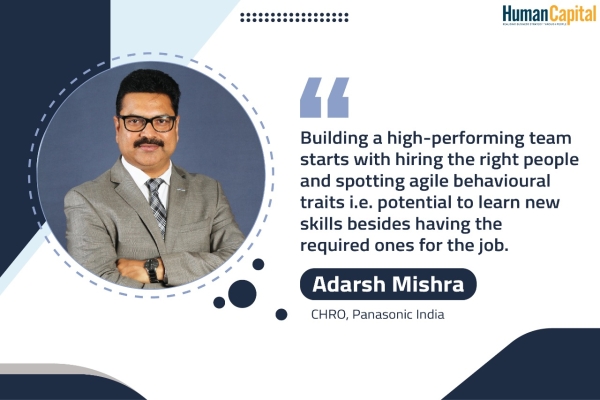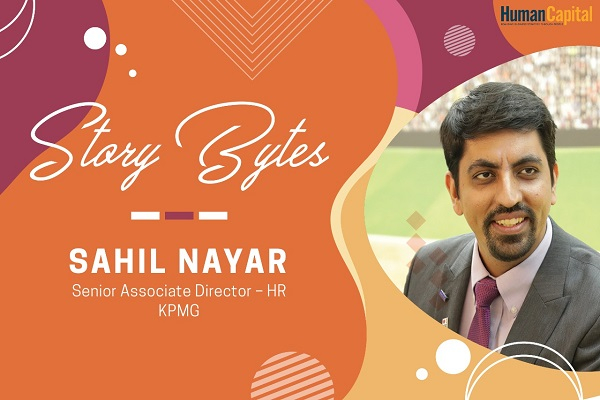The current times call for an overhaul in the tried and tested ways of working, and interaction. It is therefore important for organisations and individuals to recognise that it takes time to acclimatise.
The COVID-19 pandemic has ushered in a slew of measures such as social distancing, work from home, extended lockdowns and many others. These measures have had a significant impact on our mental and emotional wellbeing. Employees at all levels are dealing with issues such as fear, anxiety, and depression. This is further exacerbated by the lack of social connect as a result of being away from work and peers. There is also an onslaught of new practices such as virtual learning and working, as well as the pressures of balancing work from home and childcare responsibilities, with combined financial losses due to pay cuts, increment freeze and layoffs.
The economic, psychological, and social consequences by such an unprecedented event viz. the COVID-19 pandemic has led to repercussions for the human race, calling for an increased focus on the concept of well- being and self-care in uncertainty. The pandemic in itself, while being neutral to demographics, has introduced or amplified issues such as socioeconomic inequalities, gender biases, and discrimination which are associated with deeper human rights. Many of the guidelines issued by governments to citizens are contingent on access to food, water, sanitation, healthcare, and social security schemes for survival without having to leave home to work.
The Challenges of Work from Home
Even with the ‘white-collared’ workforce, work from home amplifies the challenges of urban housing, tiny homes with two working members, children wanting access to laptop/broadband while the parents are working, no domestic help, and extended working hours that eat into personal time. However, organisations are turning a blind eye to the travails of existence without domestic help and the daily uncertainty of sudden changes to business plans. The pandemic also increases demands for a home with enhanced standards of cleanliness and to provide basic needs like food and water for its members. Landlord pressures to vacate homes, EMI pressures, and changes in retirement milestones due to decreased earnings, have all led to a great deal of pressure on the average employee. This has resulted in an uptake in cases of chronic stress, substance abuse, domestic violence, anxiety, depression, and selfharm, leading to significant loss of productivity, increased absenteeism, and conflict in relationships owing to such mental health challenges.
Families of four to eight members are spending days at a stretch at home, in highly confined spaces, with hardly any social interaction. This has led to disagreements, fights, and arguments that can cause friction, and take a toll on mental health. One of the key aspects of this closeted time is that it has increased physical proximity while reducing the quality of time spent with one another. Couples are battling chores, homework, financial pressures, constrained spaces, office discussions in the living room. This has changed the complexion of the relationship levers and rendered it dry and monotonous.
Pertinence of mental health
Mental health emerged at the forefront of global health priorities of this decade. Countries, communities, and organisations, however, have not treated it on an equal footing with physical health in terms of budget, advocacy and practice. Global estimates put the allocation of health budgets to mental health at less than 7% of the overall health budgets. The current pandemic has accelerated the move towards an increased focus on mental well-being. The arbitrary division of physical and mental health focus and the propensity to brush over mental health issues has created an untenable situation of unmet human needs and violations of human rights across the world.
The organised workforce which has long lived by the time-honoured notion subscribed to by western management practices which honour management hierarchy, subordination, goal setting and productivity measurement, is suddenly facing an unexpected dilemma.
Avenues to express unmet psychological needs, the need for space, the need for acceptance, and the time to grapple with their inner demons have reduced. It has also brought attention to the lack of focus on mental wellbeing and has resulted in a new narrative for mental health. This has resulted in a paradigm shift in the evolution of a human rights framework that considers mental well-being. Sustained efforts by the WHO, and the World Bank have resulted in the 2030 Agenda for Sustainable Development, making mental health a human development imperative.
With a rapid increase in mental health cases, organisations are called on to shift their attention to address mental health challenges faced by employees through action on the social and psycho-social determinants of health.
Organisations are taking a 3-pronged approach to this challenge by:
♦ Protecting mental health by minimising work–related risk factors such as conflict, stress or uncertainty.
♦ Promoting mental health by enhancing work satisfaction and providing opportunities for employees to build on their strengths
♦ Addressing mental health problems through counselling and EAP programmes.
This approach is cascaded through many interventions such as:
♦ Communication: Building an awareness of the workplace environment, the challenges of virtual work and the uncertainties, and crafting stories of warriors and providing a sense of community.
♦ Walking the Talk: Organisational leaders set the tone in terms of behaviour and action by recognising that employees have their own fragilities and provide room for acknowledging that vulnerability and not expecting them to be on top of their game at all times.
♦ Learning from best practices: Look at other companies who have acted and replicate what’s working.
♦ Demographic Segmentation of Employees: Understanding the opportunities and needs of individual employees, so that multiplicity of solutions emerges, and employees are not treated with a “one size fits all” approach.
♦ Building Support Resources: Spread awareness of sources of support and where people can find help, such as a counselling helpline, chatbots, community chats, listening to podcasts.
♦ Sensitisation of people managers: Identification of distress, early warning signals, harmful use of psychoactive substances and illness and equipping them to be a point of reference.
♦ Examining policies and practices: Organisational practices that support a healthy work-life balance.
♦ Recognition Initiatives: Recognising and rewarding the contribution of employees.
Taking proactive steps
Mental health interventions need to be rendered as a central part of an integrated health and well-being strategy that covers prevention, early identification, support and rehabilitation. Leadership alignment and acceptance of the difficulties of acknowledging is key to the effectiveness of any intervention around mental health. Organisations have a responsibility to support individuals with mental challenges in the current time. Proactive addressing of issues such as flexible hours, work–life balance, respect for personal time, addressing negative workplace dynamics, and supportive and confidential communication can help to ameliorate the issue.
The current times call for an overhaul in the tried and tested ways of working, and interaction. It is important for organisations and individuals to recognise that it takes time to acclimatise and this would likely impact the work delivery. Some things may slip up or be less than perfect, and it is alright to take it slow and easy. Establishing new routines, re-charting new ways of doing things and reprioritising earlier commitments might require that we allow ourselves some time to take a deep breath, and may require us to proactively reach out to our leaders and inform them about the challenges. The good part about all of us being in this together is that managers are more understanding of the travails and are more willing to accommodate, and its best to deal with the issue sooner rather than later.
Follow and connect with us on LinkedIn, Facebook, Instagram, Twitter for latest HR news and insights.
Does your organisation support you in maintaining work-life boundaries?
Trending
-
SBI General Insurance Launches Digital Health Campaign
-
CredR Rolls Out 'Life Happens' Leave For Its Employees
-
Meesho Announces 30-Week Gender-Neutral Parental Leave Policy
-
Microsoft Unveils Tech Resilience Curriculum To Foster An Inclusive Future
-
60% Indian Professionals Looking For Job Change Due To COVID: Survey
-
SpringPeople And Siemens Collaborate For Digital Transformation Push
-
86% Professionals Believe Hybrid Work Is Essential For Work Life Balance: Report
-
Almost 1 In Every 3 People's Personal Life Affected Due To Work Stress
-
Meesho Rolls Out Reset And Recharge Policy For Employees
-
80% Of Talent Leaders & Academics Say Pandemic Changed Skill Needs For Youth: Report
-
Hero Electric Rolls Out 'Hero Care' Program For Employees
-
Human Capital In Collaboration With ASSOCHAM Hosts Virtual Conference
-
IKEA India, Tata STRIVE Collaborate To Create Employability And Entrepreneurship Opportunities
-
SAP India, Microsoft Launch Tech Skilling Program for Young Women
-
DXC Technology, NASSCOM Collaborate For Employability Skills Program
-
Lenskart To Hire Over 2000 Employees Across India By 2022
-
Mindtree Launches Learn-and-Earn Program
-
Tata AIA Extends 'Raksha Ka Teeka' To Its Employees
-
Swadesh Behera Is The New CPO Of Titan
-
NetConnect Global Plans To Recruit 5000 Tech Professionals In India
-
Hubhopper Plans To Hire 60% Of Indian Podcasters By 2022
-
Corporate India Needs More Women In Leadership Roles: Report
-
Aon to Invest $30 Million and Create 10,000 Apprenticeships by 2030
-
Tech Mahindra Launches ‘Gift a Career’ Initiative for Upskilling of Youth
-
40% Women Prefer Flexible Working Options in Post-COVID World: Survey
-
3 out of 4 companies believe they can effectively hire employees virtually: Report
-
Vodafone , CGI and NASSCOM Foundation launch digital skills platform
-
Odisha: Bank, postal employees to deliver cash for elderly, differently-abled persons
-
Skill India launches AI-based digital platform for "Skilled Workforce"
-
Hiring activity declines 6.73% in first quarter: Survey
-
70% startups impacted by COVID-19 pandemic
-
Bajaj Allianz Life ropes in Santanu Banerjee as CHRO
-
Over 70 Percent MSMEs look at cutting jobs to sustain businesses
-
93 Per Cent employees stressed about returning to office post-lockdown
-
Johnson & Johnson India announces family benefits for same gender partners
-
Indian firms turning friendly towards working mothers
-
Welspun India names Rajendra Mehta as new CHRO
-
Wipro partners with NASSCOM to launch Future Skills platform



Human Capital is niche media organisation for HR and Corporate. Our aim is to create an outstanding user experience for all our clients, readers, employers and employees through inspiring, industry-leading content pieces in the form of case studies, analysis, expert reports, authored articles and blogs. We cover topics such as talent acquisition, learning and development, diversity and inclusion, leadership, compensation, recruitment and many more.
Subscribe Now



.JPG)









































Comment